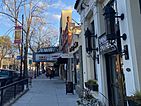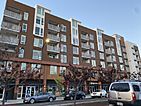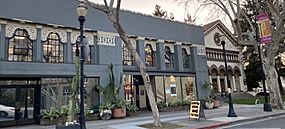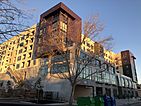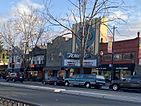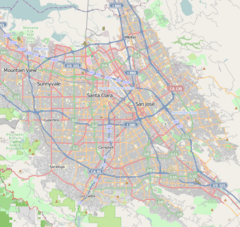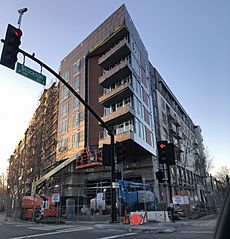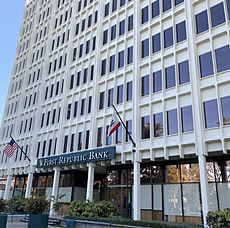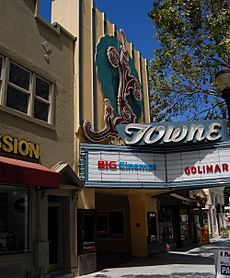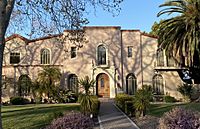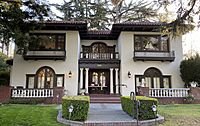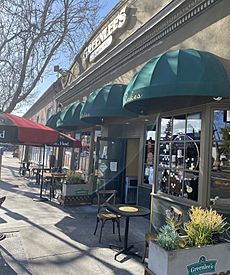The Alameda, San Jose facts for kids
Quick facts for kids
The Alameda
|
|
|---|---|
|
Neighborhood of San Jose
|
|
| Country | United States |
| State | California |
| County | Santa Clara |
| Cities | San Jose (partially in Santa Clara) |
The Alameda is a special historic area in Central San Jose, California. It is located just west of Downtown San Jose. The main part of this area is a famous street called The Alameda. This street's name comes from a Spanish word meaning "tree-lined street."
The Alameda street is a historic section of El Camino Real. This old road once connected Downtown San Jose to Mission Santa Clara de Asís. The Alameda district also includes smaller neighborhoods nearby, like College Park and St. Leo's.
Contents
History of The Alameda Street
The Alameda street was first built around 1795. Native American workers from Mission Santa Clara de Asís created it. They followed orders from Father Magin Catalá. The goal was to link the mission with El Pueblo de San José de Guadalupe, which is now the city of San Jose.
When it was first built, the road had ditches on both sides. These ditches brought water from the Guadalupe River and Mission Creek. This water helped irrigate fields and filled a pond near the mission.
In 1799, willow trees were planted in rows along the road. People from the pueblo used this tree-lined path. They walked it to attend Sunday Mass at the mission chapel. This was before St. Joseph's Church was built. The last original willow tree was removed in 1982.
The first stagecoach line in California started here in 1849. It ran between San Jose and San Francisco along The Alameda. Later, the San Jose and Santa Clara Railroad opened on The Alameda in 1868. It was the first interurban railroad in California, using horse-drawn cars.
In 1888, it became the second electric streetcar line in California. It was also the first electric interurban streetcar in the West. It first used an underground power system. Then, in 1889, it switched to an overhead trolley system.
In the late 1800s and early 1900s, many rich families built large homes along The Alameda. The Dunne mansion, built in the 1890s, is one of the oldest buildings still standing on the street. Coachella Valley Church, located north on The Alameda, was built in the 1920s. The street was first paved in 1912.
Modern Changes to The Alameda
The Alameda used to go right through the middle of the Santa Clara University campus. Now, that part of the road is a walking path for students and visitors. El Camino Real now goes around the campus. It carries State Route 82 to bypass the university.
A book called The Alameda: The Beautiful Way was published in 2006. It shares the interesting history of The Alameda.
Exploring The Alameda District
The Alameda is both the name of a historic street and the area around it. This district includes smaller neighborhoods. These are places like St. Leo's and College Park.
To the west and south of The Alameda, you will find the Rose Garden district. To the east, you can explore Downtown San Jose.
At its end near the SAP Center, The Alameda street changes into Santa Clara Street. This street goes through Downtown San Jose. After that, it becomes Alum Rock Avenue in East San Jose.
Cahill Park is a nice park located in the St. Leo's area of The Alameda district.
Architecture and Landmarks
The Alameda is famous for its beautiful old buildings. You can see many different styles of Californian architecture here. Some examples include Spanish Colonial Revival, Californian Churrigueresque, Plateresque revival, and Mission Revival architecture.
Famous Buildings and Places
Here are some important landmarks you can find on The Alameda:
- Coachella Valley Church
- Westminster Presbyterian Church
- Towne Theatre
- Greenlee's Bakery
- Schurra's Candies
- Hanchett Park Building
- Old Bank of Italy Branch
- Leib Carriage House
Images for kids
-
Spanish Colonial Revival architecture
 | Audre Lorde |
 | John Berry Meachum |
 | Ferdinand Lee Barnett |


